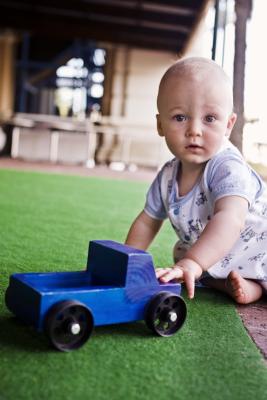When your baby first enters the world, he will be helpless. This will all change quite rapidly, though — perhaps more rapidly than you would like. During the first year of your baby’s life, he will transform in front of your eyes, changing from that helpless infant to a moving child capable of getting into anything and everything in his path.
The Biggies
When it comes to motor development, many moms are most excited to see the major, gross motor developments that their child experiences as he moves through infancy. During your child’s first year to 18 months of life, you can expect to encounter three major motor skills developments. Around 6 months, your child will likely roll over for the first time. At 9 months, he will most likely begin to crawl. Somewhere between 10 and 14 months, you can expect him to take those first clumsy steps to which you have so been looking forward.
Fine Motor Development
While less noticeable than the major gross motor skill developments, your baby will also advance her fine motor skills during this first year of her life. You will likely see the first fine motor milestone reached around 3 months. Around this time, your child will develop the ability to grasp objects. At 6 months, your child will develop the ability to pass objects back and forth between his hands.
Encouraging Development
Most of the advances your child will make in motor skills development will take place without your intervention; however, there are some simple things you can do to help your child as he moves through these developmental stages. If you want to encourage your child to build these skills, try a scaffolding approach. Scaffolding involves giving your child continually less support as he moves through his development, encouraging him to pick up the skills you teach. For example, if you want to teach your child how to walk, you can begin by holding his hands and helping him take some steps. Then you can repeat the procedure by holding only one hand. Then finally, sit across the room, and encourage him to come to you without assistance.
Motor Skill Enhancing Toys
When buying your infant toys, look for options that will help him develop his motor skills. Toys with small buttons, for example, may help your child improve his fine motor skills. Balls are also useful, as children have a natural desire to pass them back and forth. Also seek toys with an assortment of enticing objects hanging from them as these toys encourage your child to manipulate these pieces.
Milestones Missed
While milestones do tell you when you can likely expect your child to reach a developmental stage, they are not set in stone. If your child misses a milestone, don’t fret. You may not have anything to worry about, reports WebMD. These milestones are merely averages, and as such, failure to reach one isn’t necessarily a sign of a motor skills deficiency.





